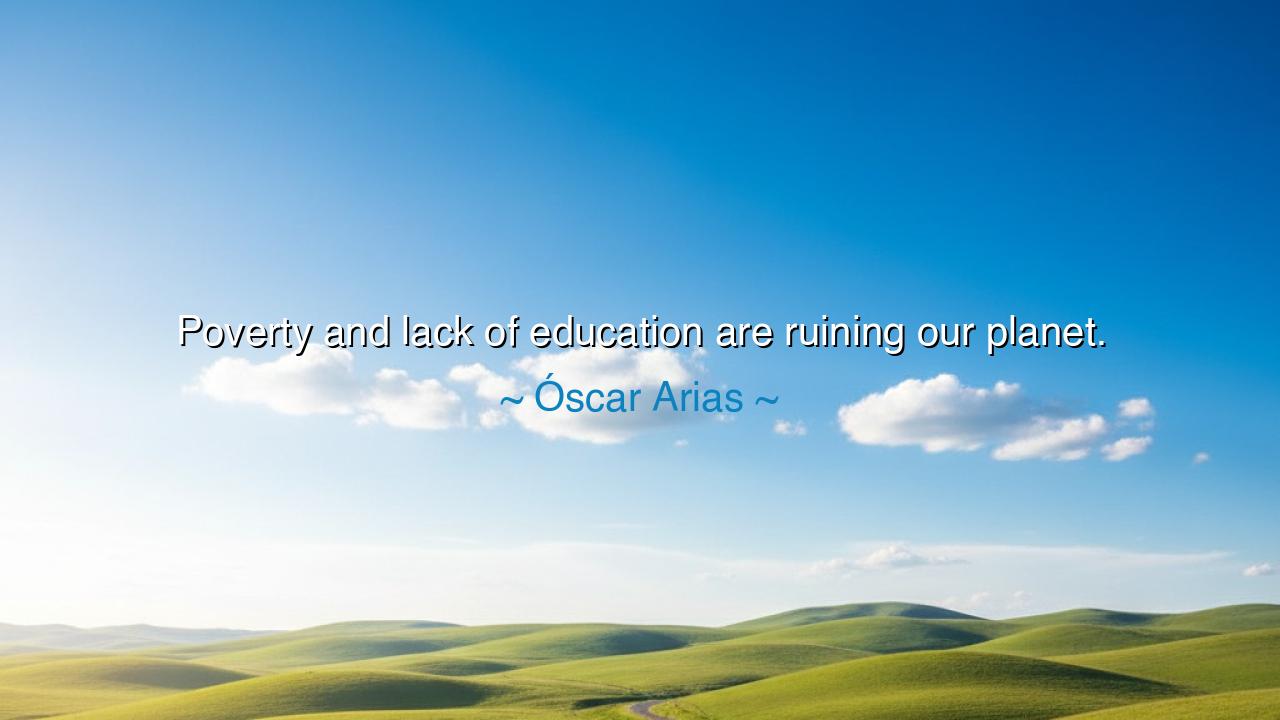
Poverty and lack of education are ruining our planet.






Hear the words of Óscar Arias, the Nobel laureate and peacemaker, who declared with solemnity: “Poverty and lack of education are ruining our planet.” These words, though brief, thunder with the weight of truth. For Arias, who guided Costa Rica through a path of peace and foresight, knew that the greatest threats to our future are not only bombs and armies, but the silent forces that corrode the foundations of human dignity: poverty and ignorance.
What is poverty but the chain that binds millions in hunger, despair, and desperation? The poor are not weak by nature; they are stripped of opportunity, denied the tools to rise. And what is the absence of education but a blindness of the mind, a darkness where light should dwell? Together, these two forces become twin destroyers—not only of individuals, but of societies, of nations, and of the earth itself. For where poverty reigns, people are driven to exhaust the land to survive; where ignorance persists, the folly of short-sighted choices leads to devastation of forests, rivers, and skies.
History offers us a clear vision of this truth. In the age of the Industrial Revolution, when factories rose in smoke and workers toiled without knowledge, the drive for survival ravaged both people and nature. Children worked in mines, rivers ran black with pollution, and cities drowned in disease. It was only when education spread—when reformers taught the value of sanitation, the rights of workers, and the stewardship of nature—that change began. Poverty unchecked destroyed both human lives and the earth, but knowledge opened the path to healing.
Arias himself saw the scars of Central America, where civil wars once burned. He knew that without addressing poverty and without spreading education, peace would remain fragile. For a hungry man cannot dream of tomorrow; an ignorant child cannot build a brighter world. Thus his words are not simply lamentation but prophecy: if humanity ignores these roots of suffering, the planet itself will wither. Yet if we confront them with courage, we may yet secure a future of harmony.
The meaning of this quote is both simple and profound: the greatest dangers to the earth are not only external forces but the failures within us—the failure to lift the poor, the failure to teach the unlearned. Weapons may kill quickly, but poverty kills slowly, in silence; ignorance wounds invisibly, passing misery from one generation to the next. To save the planet, one must first save its people.
The lesson for us is clear. To fight climate change, to heal societies, to create peace, we must first strike at the roots of poverty and ignorance. No technology, no law, no treaty can succeed if billions remain locked in hunger and blindness. A tree cannot flourish if its roots rot; neither can humanity thrive while so many remain denied the nourishment of dignity and education.
And what actions must you take? Support schools, wherever they may be built. Teach, if you can teach. Share knowledge freely, for every mind awakened is a light against darkness. Give aid not as charity alone, but as empowerment—so that the poor may rise by their own strength. Defend policies that lift people from hunger and grant them tools for learning. And in your own life, never despise the unlearned or the impoverished, but extend to them the same hand you would hope for in your hour of need.
Thus let Arias’s words be remembered as a command across the generations: “Poverty and lack of education are ruining our planet.” But they need not have the final word. If we choose to act, if we choose to lift and to teach, then what is now ruin may yet become renewal. The earth may heal, and humanity may flourish, not through power alone, but through compassion, wisdom, and the will to share the light of education with all.






AAdministratorAdministrator
Welcome, honored guests. Please leave a comment, we will respond soon